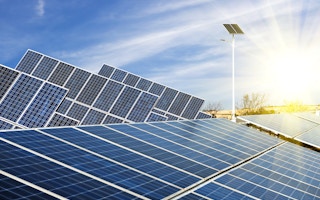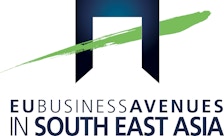Look across Singapore’s rooftops in the future and you might see a field of intelligent solar panels that can change their angle throughout the day to capture as much light as possible, just like plants.
DEGER, a German company, has developed a light tracking system for solar panels that monitors the intensity and direction of incoming light, including direct sunlight and reflected light, and tilts each panel to maximise its use.
The technology could well be deployed in Singapore in future, as the company along with 36 others from the European Union’s (EU) green energy technologies sector will visit Singapore and Malaysia next week and showcase their products at the Singapore International Energy Week (SIEW), held at the Marina Bay Sands Expo and Convention Centre from October 24 to 29.
The week-long Green Energy Technologies business mission was organised by the EU as part of its new EU Business Avenues in Southeast Asia programme.
The initiative was launched in June and aims to bring up to 1,000 European small and medium enterprises (SMEs) on week-long trips to Southeast Asia over the next five years to help them develop their businesses outside of Europe.
“Southeast Asia is emerging as a key player in global energy with its openness to adopting newer and cleaner technologies,” says Dr Michael Pulch, the EU ambassador to Singapore. “The region has great potential for renewable energy.”
A brighter future for solar power
DEGER’s technology, for instance, would be especially useful for Southeast Asian countries with regular cloudy weather and monsoon periods, such as Singapore, says the firm’s international sales manager Peter Scherer.
Unlike other systems that consider only the sun’s position when angling solar panels, DEGER’s technology uses a light detection sensor that takes into account all sources of light, including direct sunlight, diffused sunlight that has passed through clouds and light reflected from surfaces such as water, sand and gravel.
“
Southeast Asia is emerging as a key player in global energy with its openness to adopting newer and cleaner technologies. The region has great potential for renewable energy.
Michael Pulch, EU ambassador to Singapore
“If there’s an overcast sky, our system will stay in a horizontal position and collect all indirect radiation. Astronomical-controlled systems would continue to angle the panels to where they predict the best angle to the sun, even if it’s blocked by clouds,” says Scherer.
Founded in 1999, DEGER has installed more than 75,000 of its systems in 64 countries, including India, South Korea and Malaysia. Tests carried out in southern Germany by the independent Fraunhofer Institute for Solar Energy Systems found that DEGER’s technology could improve solar panels’ yield by up to about 43 per cent compared to static systems, and up to around 5 per cent compared to astronomical-controlled systems.
The firm also won an ASEAN Renewable Energy Award in 2015 for a 12 kilowatt peak (kWp) system that it installed at the Solar Energy Research Institute at the University of Malaysia.
Its technology could benefit Singapore, which aims to use solar power for 5 per cent of its energy needs by 2020. The Energy Market Authority, which oversees Singapore’s energy sector, has said that it is looking at methods to address solar power challenges in the country such as cloud cover.
There are now 1,409 solar panel installations in Singapore that generate about 100 megawatt peak (MWp) in total, enough to meet 1.5 per cent of its current electricity demand.
Powering up electric vehicle plans
Another company, Finnish AC2SG Software, aims to target Singapore’s electric vehicle ambitions with its innovations.
By 2020, Singapore will have 1,000 electric vehicles and 2,000 charging points island-wide as part of a national electric vehicle car-sharing programme. The first fleet of 125 cars will be rolled out from the middle of next year.
Established in 2012, AC2SG specialises in software to optimise electric vehicle plans and businesses, including where to place charging stations, which types of charging stations to install and how to minimise their civil engineering costs.
Jaakko Aho, the firm’s founder, notes that a quick charging station can cost more than US$40,000 (S$55,600), compared to a simple residential one that costs up to US$1,000.
“Since Singapore is geographically small, the need for quick chargers is likely to be minimal since people will drive short distances,” he says. “On the other hand, there should be as many as stations as possible because of the dense population.”
He suggests that Singapore’s housing blocks could have less expensive charging stations that take up to eight hours to fully recharge an average electric vehicle, while malls and public buildings should have stations that take no more than three hours and 90 minutes respectively for a full charge.
Some busy locations should also have quick charging stations that do the job in less than 30 minutes.
“Civil engineering costs for charging stations are determined by the availability of grid outlets at the location, the power needed for the station and whether the station is wall-mounted or ground-mounted,” he adds. “Our software can help planners to identify locations with the least expensive engineering costs.”
While AC2SG now operates in northern Europe, where it has customers in Finland and Switzerland, it wants to break into the Southeast Asian market.
“We are particularly interested in Singapore because it is a forward-looking city and a good gateway to other Southeast Asian markets,” says Aho. “Malaysia is another opportunity for us because its government has announced ambitious plans for electric vehicles by 2020, and the infrastructure needs to be built in the next few years.”
An opportunity for Singapore businesses
The 37 European companies will share more about their technologies, which also includes innovations in biofuels and energy storage, at the Asia Clean Energy Summit 2016 Conference and Exhibition on Tuesday and Wednesday next week, which is part of SIEW.
“These companies were selected because they have strong technical capabilities and proven technologies that are relevant for Singapore and Malaysia,” says Pulch, the ambassador.
“By partnering European companies and sharing technological know-how, Singapore and Malaysian businesses can benefit from Europe’s broad and deep innovation base.”
The companies will showcase their green energy technologies at the Asia Clean Energy Summit 2016 Conference and Exhibition at the Marina Bay Sands Expo and Convention Centre on Oct 25 and 26. The summit is part of the Singapore International Energy Week.











